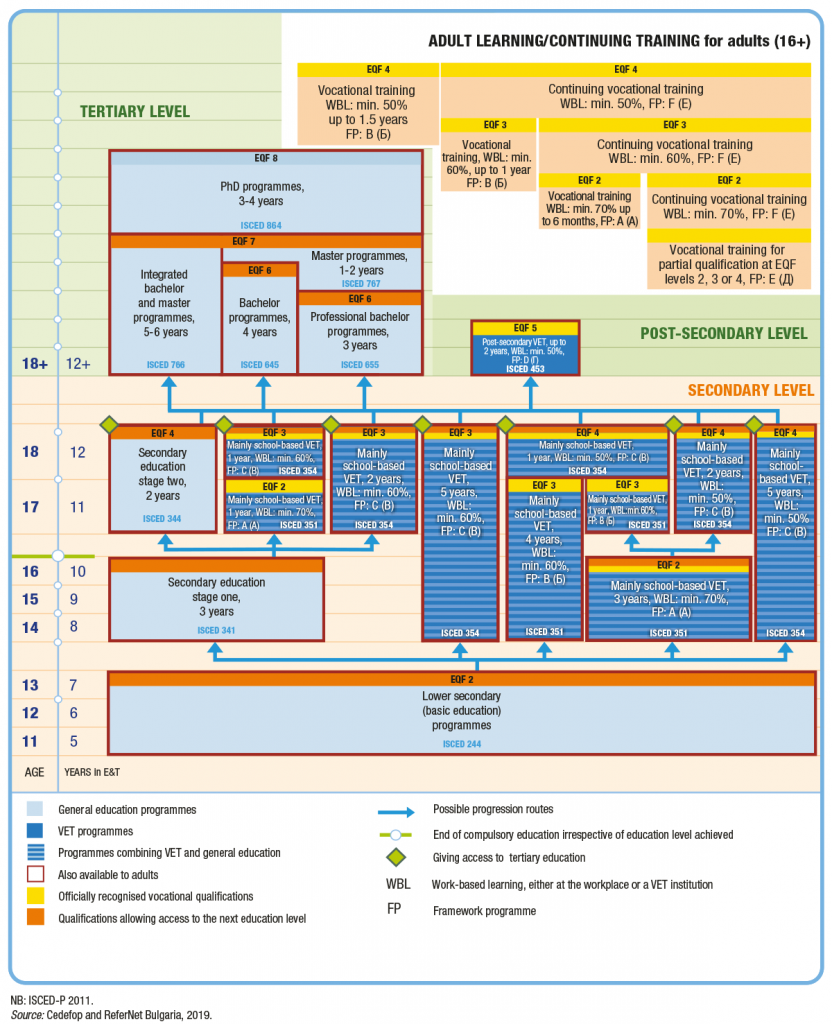ЗА CEDEFOP
Европейската агенция за развитие на професионалното обучение (Cedefop) е създадена през 1975 г., със седалище в Гърция. От 1995 г., агенцията подкрепя насърчаването, разработването и прилагането на политиката на ЕС в областта на професионалното образование и обучение (ПОО), както и на политиките в областта на уменията и квалификациите, като работи съвместно с Комисията, държавите членки и социалните партньори.
Cedefop предоставя факти и услуги за разработване на политиките, включително основани на научни изследвания заключения, и улеснява обмена на знания сред заинтересованите страни.
Анализите и изследванията на Cedefop подобряват разбирането за силните и слабите страни на системите за ПОО и предоставят задълбочена информация относно социалните, икономическите и личните ползи от ПОО.
Със своята фактологична база и анализи Cedefop подкрепя усилията на държавите и социалните партньори за разширяване на ученето в процеса на работа, включително качественото и ефективно чиракуване. Като се опира на аналитичния си капацитет и експертния си опит в областта на професионалното ориентиране през целия живот, валидирането на уменията и финансирането на ПОО, Cedefop подкрепя усилията за разработване на стратегии за повишаване на уменията на хората с ниски умения и за прилагане на стълба на социалните права.
С цел да спомогне за набавянето на информация за целите на политиката и предоставянето на ПОО, а в по-общ план — за избор от страна на хората на образование и професионално развитие, Cedefop разработва общоевропейски подходи за разбиране на текущото търсене и предлагане на умения и предвиждането им в бъдеще.
Тази работа в областта на пазара на труда и проучването на уменията и връзките между работните места, уменията и квалификациите позволява да се подобри управлението на ПОО и да се модернизира проактивно ПОО в стремежа към изграждане и поддържане на пригодността за заетост на учащите и работещите и на конкурентоспособността на предприятията. Това спомага за разширяване на профила на ПОО отвъд политиките в областта на образованието, обучението и заетостта, не на последно
място чрез работа в областта на „зелените“ умения и дейности с насоченост към цифровизацията, изкуствения интелект и бъдещето на труда.

ЗА REFERNET
ReferNet е общоевропейска мрежа от институции за обмен на опит и експертиза в областта на професионалното образование и обучение, създадена от Cedefop през 2002 г., за да предоставя информация за националните системи и политики за професионално образование и обучение (ПОО) в държавите-членки на ЕС, Исландия и Норвегия.
От 2013 година координиращата институция на дейностите на мрежата в България е Националната агенция за професионално образование и обучение (НАПОО).
Всеки национален партньор е ключова организация, участваща в ПОО в страната, която представлява. Следователно всички партньори са в особено добра позиция да предложат информация от първа ръка за ролята, целта, управлението и структурата на ПОО, информация за развитието и тенденциите в политиките за ПОО, както и задълбочен анализ на напредъка на всяка страна в прилагането на общите европейски политически цели. С дейността си партньорите в ReferNet подкрепят Cedefop в мониторинга, оценката и докладването на напредъка на страните, в прилагането на съвместните приоритети за професионално образование и обучение (ПОО), както са определени в Препоръката на Съвета относно ПОО и Декларацията от Оснабрюк, като се спазват приоритетите, избрани от страните в техните национални планове за изпълнение (НИП).
ReferNet подкрепя Cedefop чрез
(а) докладване за националните системи за ПОО и развитието на политиките в областта на ПОО, уменията и квалификациите; и
(б) повишаване на видимостта на ПОО и разпространение на информация за ПОО, уменията и квалификациите.
ReferNet информира за ролята, целта, управлението и структурата на ПОО, уменията и квалификациите. ReferNet предоставя информация за развитието и тенденциите, както и анализи за това как всяка страна напредва в изпълнението на общите европейски политически цели.
ReferNet е платформа за обмен на информация, споделяне на практики и идеи и насърчаване на разбирането на различните предизвикателства в страните партньори. Съвместната работа осигурява по-силна база от доказателства за ПОО, уменията и квалификациите и свързаните с тях въпроси в Европа.
Партньорите на ReferNet в различните страни организират тематични дискусии, взаимно обучение и обмен на информация, както и разпространение на разработките на национални политики.
НАПОО се подкрепя от „националния представител за ReferNet в България“ – това е Директорът на Дирекция „Професионално образование и обучение“ в МОН. Задачата на националния представител е да валидира подготвената за представяне в Cedefop информация. Така се гарантира, че информацията е точна и в съответствие с националните политики и стратегии. Дейностите на ReferNet изискват сътрудничество с широк кръг от национални заинтересовани страни. За изготвяне на документи, доклади, анализи, справки НАПОО привлича експерти от държавни институции, изследователски звена, работодателски организации, обучаващи институции и др.
За повече информация за ReferNet вижте тук ReferNet | CEDEFOP
ReferNet България
Общоевропейска мрежа за обмен на опит и експертиза в областта на професионалното образование и обучение
В мрежата са представени всички страни-членки на Европейския съюз, Исландия и Норвегия. За периода 2013 – 2027 година координиращата институция на дейностите на мрежата в България е Националната агенция за професионално образование и обучение (НАПОО).
създ.
2002
Европейската агенция за развитие на професионалното обучение - CEDEFOP
28
страни-членки на Европейския съюз, Исландия и Норвегия


Adults in lifelong learning (%)
1.6% in Bulgaria in 2020
Vocational education and training system chart

The employment in Bulgaria is still mostly driven by manufacturing industry and wholesale and retail trade, followed by public administration and construction. The economic crisis resulted in a fall in employment between 2008 and 2013, from which the labour market is recovering slowly. Employment decline is expected till 2030 and the working age population (15-64) will shrink because of high level of retirements.
Fastest employment growth in Bulgaria is expected in public sector & defence and education. Customer clerks and assemblers will add most new jobs in 2020-2030 period. Because of still-strong agriculture sector, skilled agricultural workers should be the fastest growing occupation, followed by legal & social professionals and protective service workers. Till 2030, more than half of all job openings (including replacements for vacated jobs) in Bulgaria will be for high level qualifications.
Public spending on education in Bulgaria is increasing, though the system remains underfunded and measures do not fully match the magnitude of the challenges. Despite ongoing efforts, early school leaving remains problematic, particularly among the Roma and in rural areas. The rate of early leavers has increased from 12.7% in 2018 to 13,9% in 2019 (EU average 10.2%). Measures to return out-of-school children to education are in place, and support is being offered to overcome learning gaps and to increase motivation. However, overall enrolment rates in school education are not improving and dropout rates remain high. The percentage of underachievers in science, maths and reading in the 2018 Programme for international student assessment (PISA) is 47.1%, 44.4% and 46.5% respectively, which is around double the EU average.
